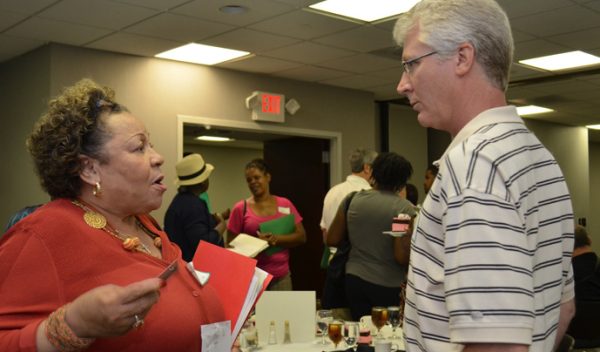Community Partnership Expands Connections at UNC Charlotte

Neighborhood change, spatial justice, empowerment and citizens’ rights, communities and schools, and safety provided the focus for Charlotte Action Research Project’s first Neighborhood Campus Forum, held at UNC Charlotte on May 29 with the support of a Chancellor’s Diversity Challenge Grant.
Approximately 40 UNC Charlotte students, faculty, staff and residents of Graham Heights, Reid Park, and Enderly Park collaborated on ideas and strategies for expanding a community-university partnership that has largely been associated with Geography and Earth Sciences students and faculty in the past.
“We really want to pull many more people into the neighborhoods,” said Janni Sorensen, a faculty member in the Department of Geography and Earth Sciences who formed CHARP in 2008. The forum focused on generating ideas, creating networks, and building relationships with a broader array of UNC Charlotte faculty, students and staff.
CHARP began when Sorensen’s undergraduate and graduate students formed partnerships with a handful of selected neighborhoods. In 2009, the initiative expanded with a partnership with the City of Charlotte Neighborhood and Business Service Divisions. Residents identify and prioritize specific tasks to address, and campus partners work with the residents on these projects. They, in turn, receive access to local information, which is helpful to their research projects.
“I appreciate the support of the UNC Charlotte people,” said Cora Robinson, who has lived in Enderly Park for 35 years.
At the forum, community leaders described needs and goals, which include the common goals of preserving and building relationships and improving the quality of their communities. Residents described why their neighborhoods are home to them.
Angela Edwards, a resident of Reid Park, said that she did not like the area when she first moved there. It was not until she began to fall in love with her house and get to know her neighbors that she built a compassion and attachment to her new home.
Area leaders spoke of some of the fears and problems associated with the change and gentrification of their communities. They also described their strategies for dealing with these issues, as they work with UNC Charlotte people.
“We try to place ourselves in a position where we can advocate for our community’s needs,” said Rickey Hall, a Reid Park leader. The residents look for opportunities to serve on city boards and committees where decisions about systemic issues are made, for example.
Edwards’ daughter, Brittany, also from Reid Park, said that she learns new things from her neighborhood each day. “Reid Park is not just somewhere I lay my head, it’s my home,” she said. “If our people won’t change it, who will?”
With efforts to integrate teaching, research, and action organized around a larger agenda of social justice, members of CHARP and other attendees brainstormed possible projects to help keep the communities intact.
People who are interested in building partnerships with the residents may attend the communities’ monthly meetings, held the first Monday of each month for Graham Heights and Enderly Park and the first Tuesday of each month for Reid Park. More information can be found on CHARP’s website.
Words: Kendall Cook